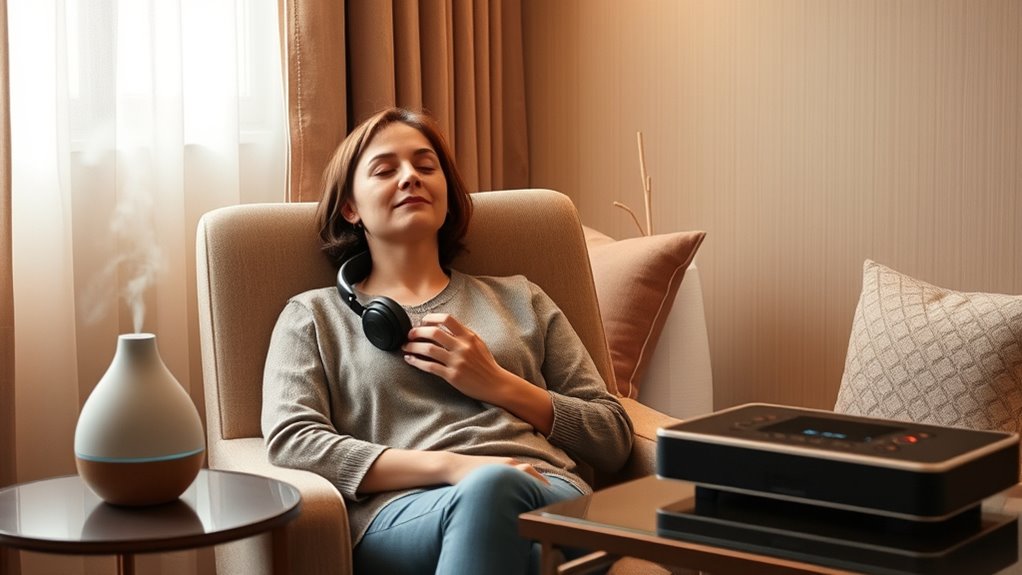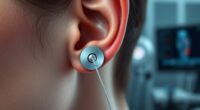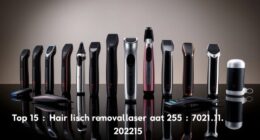Managing hyperacusis and tinnitus together involves understanding their shared neural pathways, recognizing triggers, and using strategies like sound masking, ear protection, and relaxation techniques. You can reduce discomfort by avoiding loud environments, creating calm spaces, and supporting your emotional health through stress management. Therapies like sound desensitization and cognitive-behavioral approaches can help retrain your brain. If you want to learn more about effective ways to cope, you’ll find helpful insights further along.
Key Takeaways
- Recognize the shared neural pathways and neural plasticity involved in hyperacusis and tinnitus to develop targeted coping strategies.
- Use sound therapy, masking, and environmental modifications to reduce sensory overload and manage sound sensitivities.
- Identify triggers and implement proactive coping mechanisms like ear protection and calm spaces to prevent discomfort.
- Incorporate relaxation techniques, stress management, and emotional support to improve emotional regulation and resilience.
- Educate yourself and others about these conditions to foster understanding, reduce stigma, and enhance support networks.
Understanding Hyperacusis and Tinnitus: What You Need to Know

If you’re experiencing unusual sensitivity to sounds or persistent ringing in your ears, understanding hyperacusis and tinnitus is vital. These conditions affect your auditory processing, making normal sounds seem painfully loud or overwhelming. Hyperacusis can heighten your awareness of everyday noises, while tinnitus causes constant or intermittent ringing that no external source produces. Both can impact your emotional regulation, leading to frustration, anxiety, or depression. Recognizing how your brain processes sound helps you grasp why these conditions develop and persist. Managing emotional responses is essential because heightened emotions can intensify your perception of sound sensitivities. Educating yourself about these conditions provides a foundation for effective coping strategies and seeking appropriate treatment to regain control over your auditory experience. Additionally, advances in hearing-related technology are offering new options for managing these auditory conditions more effectively.
How These Conditions Interconnect and Influence Each Other

Your brain processes hyperacusis and tinnitus through shared neural pathways, making them closely linked. When one condition activates these pathways, it can amplify your sensory responses, worsening the other. Understanding this connection helps explain why managing one often impacts the other. Additionally, the heightened sensory processing associated with these conditions can be influenced by factors such as projector image quality, which impacts how sensory stimuli are perceived and processed in related neural circuits.
Shared Neural Pathways
Hyperacusis and tinnitus often share common neural pathways that contribute to their co-occurrence and mutual influence. These conditions involve the auditory pathways, which transmit signals from your ears to your brain. Neural mechanisms within these pathways can become hyperactive or misfiring, amplifying sound perception or creating phantom noises. When these neural circuits are sensitized, they heighten your auditory response, making everyday sounds seem overwhelming or generating persistent ringing. The overlap in neural pathways explains why treating one condition can sometimes affect the other. Your brain’s plasticity allows these pathways to adapt, but it also means they can become maladaptive, reinforcing the symptoms of both hyperacusis and tinnitus. Understanding these shared neural mechanisms helps guide effective management strategies. Additionally, research into neural plasticity offers promising avenues for developing therapies aimed at recalibrating these overactive pathways.
Amplified Sensory Response
Have you ever noticed how sounds can suddenly feel unbearably loud or intrusive? This is an amplified sensory response, common with hyperacusis and tinnitus. Your nervous system becomes hypersensitive, leading to sensory overload that impacts your emotional regulation. This heightened sensitivity makes everyday noises seem overwhelming, causing stress and anxiety. To manage this, consider strategies like:
- Using sound masking devices
- Practicing relaxation techniques
- Limiting exposure to loud environments
- Creating a calm, controlled space
- Developing awareness of your sensory thresholds
These approaches help reduce the intensity of your reactions, allowing you to better regulate your emotions and lessen the discomfort caused by an amplified sensory response. Understanding sensory processing can also help you develop more effective coping mechanisms. Recognizing this connection is essential in managing both hyperacusis and tinnitus more effectively.
Recognizing Common Triggers and Managing Sound Sensitivity

Identifying common triggers is essential for managing sound sensitivity effectively. You should pay attention to specific sound triggers that worsen your hyperacusis or tinnitus, such as loud noises, crowded places, or sudden sounds. Recognizing these triggers helps you anticipate situations that may cause discomfort. Once identified, you can develop coping mechanisms like wearing ear protection, avoiding noisy environments, or using calming background noise. Staying aware of your triggers allows you to take proactive steps to minimize exposure and reduce stress. Being aware of vetted products designed for sound protection can also enhance your ability to manage exposure safely. Managing sound sensitivity is about understanding what sets off your symptoms and implementing strategies to stay comfortable. With practice, you’ll become better at controlling your environment and preventing unnecessary discomfort, improving your overall well-being.
Practical Strategies for Daily Sound Management

To effectively manage sound sensitivity day-to-day, implementing practical strategies can make a significant difference in reducing discomfort and stress. Incorporate sound therapy and relaxation techniques into your routine to create a calmer environment. You might:
Implement practical strategies daily to reduce discomfort and create a calmer, more manageable environment.
- Use noise-canceling headphones during noisy activities
- Create a quiet space at home for breaks
- Practice deep breathing or meditation for relaxation
- Limit exposure to loud environments whenever possible
- Incorporate calming background sounds, like gentle music or white noise
- Utilize predictive modeling insights to better anticipate and prepare for challenging sound environments
These strategies help you regain control over your environment and prevent overwhelm. Consistently applying sound therapy and relaxation techniques can ease your sensitivity and improve your overall well-being. With persistence, daily sound management becomes more manageable, making your days more comfortable.
Therapeutic Approaches and Treatments to Consider

When managing hyperacusis and tinnitus, exploring various therapeutic approaches can substantially improve your quality of life. Sound therapy is a common option, helping you gradually desensitize your auditory system by introducing carefully calibrated sounds. This can reduce sensitivity and lessen tinnitus perception over time. Cognitive approaches, such as cognitive-behavioral therapy (CBT), focus on changing negative thought patterns and emotional responses related to your condition. These techniques help you develop healthier coping skills, decrease anxiety, and improve your overall well-being. Combining sound therapy with cognitive approaches often yields the best results, addressing both the physiological and psychological aspects of hyperacusis and tinnitus. Consulting a specialist can guide you to tailored treatments that suit your specific needs. Additionally, using diverse designs and materials in therapeutic devices can enhance comfort and effectiveness during treatment sessions.
Tips for Building a Supportive Environment and Coping Skills

Building a supportive environment plays a pivotal role in managing hyperacusis and tinnitus effectively. Creating a space that minimizes noise and promotes emotional resilience helps you cope better. You can achieve this by:
- Using noise reduction devices like earplugs or white noise machines
- Establishing quiet zones at home to escape overwhelming sounds
- Communicating openly with friends and family about your needs
- Practicing mindfulness and stress management techniques daily
- Setting boundaries to avoid overexposure to loud environments
- Staying informed about AI safety measures can help you understand technological risks and protections that might impact your digital environment.
These steps help reduce auditory stress and build emotional resilience, making it easier to handle challenging situations. A supportive environment fosters a sense of control and comfort, essential for managing the duo of hyperacusis and tinnitus.
Frequently Asked Questions
Can Hyperacusis and Tinnitus Be Cured Completely?
You wonder if hyperacusis and tinnitus can be cured completely. While there’s no guaranteed cure, you can manage symptoms through diet modifications and alternative therapies. These approaches may reduce noise sensitivity and ringing, helping you regain comfort. Staying consistent with these strategies, along with professional guidance, can improve your quality of life. Remember, managing these conditions often involves a combination of treatments rather than a complete cure.
Are There Specific Diets That Help Reduce Symptoms?
Think of your diet as a garden; what you plant influences what grows. While no specific diet cures hyperacusis and tinnitus, dietary modifications can help soothe symptoms. Focus on reducing food sensitivities like caffeine, processed foods, and alcohol, which may worsen your condition. Incorporate anti-inflammatory foods such as leafy greens, berries, and omega-3 rich fish. These choices can create a healthier environment for your ears and reduce discomfort.
How Do Medications Affect Hyperacusis and Tinnitus?
Medications can influence hyperacusis and tinnitus by causing side effects like increased noise sensitivity or ear ringing. You should be aware of potential drug interactions that might worsen symptoms. Always discuss your medication plan with your healthcare provider, so they can adjust dosages or suggest alternatives if you experience adverse effects. Staying informed helps you manage your condition better and minimizes the impact of medication side effects on your hearing health.
Can Lifestyle Changes Improve Long-Term Management?
Did you know that 80% of people report improved well-being with lifestyle changes? Yes, making simple adjustments like reducing stress and incorporating stress reduction techniques can substantially improve long-term management. You can explore healthier routines, mindful practices, and avoiding loud environments to lessen symptoms. These lifestyle modifications empower you to take control, potentially reducing the severity of hyperacusis and tinnitus, and enhancing your overall quality of life.
What Technologies Are Most Effective for Sound Therapy?
You should consider effective sound therapy technologies like noise-canceling devices and sound therapy apps. Noise-canceling devices help reduce background noise, making it easier to manage sensitive hearing. Sound therapy apps offer customizable soundscapes or calming tones that can lessen tinnitus perception and desensitize hyperacusis. These tools provide convenient, personalized support, empowering you to control your environment and improve your quality of life.
Conclusion
By mastering these strategies, you’ll turn your hyperacusis and tinnitus into minor nuisances instead of world-threatening monsters. Imagine walking through a thunderstorm of sounds and feeling like it’s just a gentle breeze—your new normal. With patience, support, and the right tools, you’ll conquer this duo so effectively that even a jet engine won’t phase you anymore. Get ready to reclaim your life—because nothing’s too loud for your newfound resilience!











